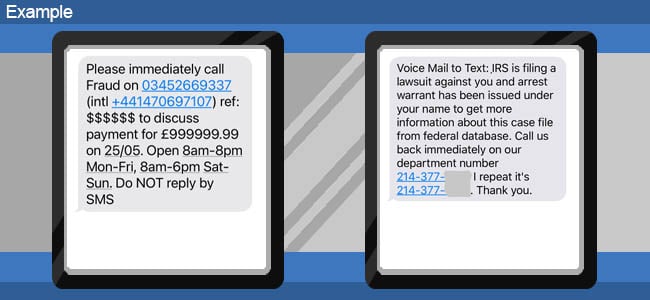Our top tips to avoiding dangerous text scams
Scam text (SMS) messages are on the rise. How can you avoid them? We discuss our top tips.
With a surge in scam texts spreading from phone to phone, falling for them could mean giving crooks access to our personal and banking information. This in turn could lead to scammers stealing our money and our identities. Follow these tips to avoid these scams.
Tips for avoiding text smishing scams
Don’t do these 3 things if you get an unexpected or suspicious text message
Scam text messages may try and –
- lure a recipient to malicious websites
- call phone numbers that will connect them to scammers
- reply with sensitive personal or financial information
So whenever you get a text message you’re not expecting…
![]()
…click on any links. You can avoid most text message scams simply by never clicking on a link in a text message (or email.) Links can take you anywhere, including spoof websites that may look like they belong to a company, but really belong to scammers. If you’re not sure if a text message is real, you can open a web browser and go to a website directly by typing in its website address, or you can ask for advice first.
(If you do click a link, you can check our post here on how to spot spoof websites.)
![]()
…call a phone number. If the message asks you to call a number, this could be a scam. A phone number can direct a victim anywhere, including a scam call centre, staffed by criminals looking to trick callers into handing over sensitive information or handing over control of their computer to crooks. If you need to call a company, go online or use official paperwork to get their legitimate number. Don’t trust a phone number on a text message.
![]()
…reply with personal or sensitive information. No company will ask you to do this, since it is not secure. If you get an unexpected text message asking you to reply with any type of information, don’t do it.
Here are two real life scam texts that ask you to click a link.

Here are two real life scam texts that ask you to call a phone number.

Sponsored Content. Continued below...
Common red flags of text scams
Sense of urgency or panic.
Text messages that seem to place an emphasis on urgency or panic in order to rush a recipient into doing something. For example the threat of fines, prosecution or arrest, or a warning that something is wrong with an online account.
Claims of rewards or money.
Text messages that claim a recipient can receive a reward such as prizes or rebates.
Spelling or grammar mistakes.
Text messages that have spelling or grammar mistakes, or use unusual characters in the messages itself.
Call to action
Text messages that contain a “call-to-action” as mentioned in the previous step, such as clicking a link, calling a phone number or replying.
Unexpected messages
Text messages that appear to have come from out-of-the-blue.
Familiarise yourself with common trends
Following the above advice should protect you from nearly every text scam coming your way, but its still worth taking the extra step of learning what text scams are trending or popular. For example, “missed delivery” scams, COVID relief scams and “unusual activity with your account” scams.
See our article here for common text scams in 2021.
Sponsored Content. Continued below...
Also, while not an exhaustive list, these are a number of popular examples of scam texts.
- Texts claiming to be from your bank about suspicious or unwanted activity with your account.
- Texts claiming to be from a retailer or courier company about a pending delivery that needs to be arranged
- Texts claiming to be from the government or tax entity about unpaid tax or tax relief.
- Texts claiming you have won a prize draw, competition or lottery, or that you are being rewarded with some type of gift or rebate.
- Texts inviting you to get a COVID-19 vaccination.
Have good security software installed.
Good security software can spot phishing website and malware-laden webpages. Our recommended security software for mobile and PCs is here.
Report
Sadly reporting scams doesn’t mean they’ll go away, but it does offer authorities a great way to spot trending scams and potentially help take some scammers down. You can report text scams by forwarding them to 7726.
Keep up-to-date with all the latest cybersecurity threats and our tips to stay safe online. Follow us on Facebook, Instagram and Twitter.
Continued below...
Thanks for reading! But before you go… as part of our latest series of articles on how to earn a little extra cash using the Internet (without getting scammed) we have been looking into how you can earn gift vouchers (like Amazon vouchers) using reward-per-action websites such as SwagBucks. If you are interested we even have our own sign-up code to get you started. Want to learn more? We discuss it here. (Or you can just sign-up here and use code Nonsense70SB when registering.)
Become a Facebook Supporter. For 0.99p (~$1.30) a month you can become a Facebook fan, meaning you get an optional Supporter Badge when you comment on our Facebook posts, as well as discounts on our merchandise. You can subscribe here (cancel anytime.)
